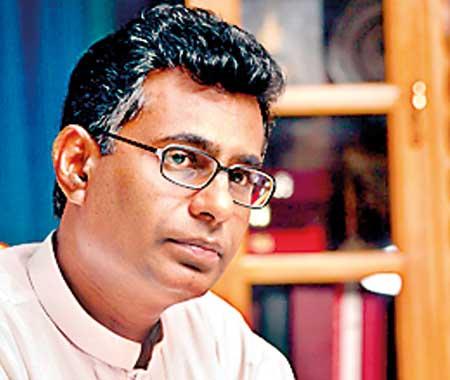Reply To:
Name - Reply Comment
“All men dream: but not equally. Those who dream in the dark recesses of the night awake in the day to find all was vanity. But the dreamers of day are dangerous men, for they may act their dreams with open eyes, and make it possible.”
– The Seven Pillars of Wisdom, T. E. Lawrence
 The Chandrika Kumaratunga government was not exactly promising. After clinching the biggest victory a political party has ever clinched at a presidential election in Sri Lanka, it did everything to alienate the Sinhala Buddhists. One of the first acts it did upon coming to power was to replace the Chairman of Rupavahini, the lyricist Sunil Sarath Perera, with a man “whose associations with the LTTE didn’t take long to come to light” (as Malinda Seneviratne put it). This is not to say that the government was led by Eelamists, though it was led by those who touted Federalism. But in the absence of a justifiable reason, it cannot say it did not aid Eelamism.
The Chandrika Kumaratunga government was not exactly promising. After clinching the biggest victory a political party has ever clinched at a presidential election in Sri Lanka, it did everything to alienate the Sinhala Buddhists. One of the first acts it did upon coming to power was to replace the Chairman of Rupavahini, the lyricist Sunil Sarath Perera, with a man “whose associations with the LTTE didn’t take long to come to light” (as Malinda Seneviratne put it). This is not to say that the government was led by Eelamists, though it was led by those who touted Federalism. But in the absence of a justifiable reason, it cannot say it did not aid Eelamism.
No one remembers the thawalama and sudu neluma campaigns now, but back then they pervaded almost every layer of the public sphere. They were the link, if not the only then the main one, between the CBK government’s conquest of Jaffna in 1995 and its defeat at the hands of the LTTE in 2000. They discouraged army recruitments. Intellectuals and artists calling for an end to this government were at the forefront of the then government’s campaign to end the war that way. It must be pointed out that those who have refused to accept official honours, and have anything to do with politics today, had no qualms about bedding with the government then.
"Now the argument can be made that the JHU represented an extra-parliamentary nationalist outfit. This is true. The JHU never played the numbers game"
And yet, despite a terrible first term, despite the harrowing prospects that first term brought with it, the people returned Chandrika Kumaratunga to power. If this was because they did not trust the United National Party, then they overcame their distaste for it by giving Ranil Wickremesinghe a parliamentary majority.
No less a nationalist outfit than the Jathika Chinthanaya called the People’s Alliance a front led by jathika blood and the children of 1956. Chandrika, of course, was quite definitively an offspring of 1956 in a way that Ranil was and is not. But the analogy ended there. The truth was, by the time the UNP captured power in parliament, the PA was fast losing the Sinhala Buddhist vote.
The government’s steadfast refusal to grant State honours for Soma Hamuduruwo upon his passing away, its belated response to the demonstrations against the PTOMs led by the  Jathika Hela Urumaya, and the fiascos over Valentine’s Day and that Shah Rukh Khan concert, should thus have ensured a massive margin of victory for the JHU at the cost of both the UNP and PA. As it turned out, it did not. The JHU, even with its relentless campaigning and the grief and anger over Soma Hamuduruwo’s passing away, clinched barely six percent of the vote in 2004.
Jathika Hela Urumaya, and the fiascos over Valentine’s Day and that Shah Rukh Khan concert, should thus have ensured a massive margin of victory for the JHU at the cost of both the UNP and PA. As it turned out, it did not. The JHU, even with its relentless campaigning and the grief and anger over Soma Hamuduruwo’s passing away, clinched barely six percent of the vote in 2004.
Now the argument can be made that the JHU represented an extra-parliamentary nationalist outfit. This is true. The JHU never played the numbers game. If it wanted to get into parliament it got in partly because of the passing away of a monk who had no ties with the party; had Soma Hamuduruwo not passed away under unfortunate and controversial circumstances, it is more than likely they would not have even clinched the six percent they got. But there is a difference in the way they operated. In that, they were miles away from its more extremist splinter group, Bodu Bala Sena.
The Sihala Urumaya was led by a group of idealists whose antipathy to the anti-Sinhala and anti-Buddhist forces in the government were not informed by opposition to minority groups per se. As such they never peddled nationalism and racialism. But the people, who had been told that the two were the same (courtesy of a government which was not just anti-racist but also anti-nationalist), did not see the point of not peddling the two. The new guard, led by Champika and Athuraliye Rathana, were not racists or racialists. But nor were they idealists. The class and ideological differences between them and the old guard were therefore apparent from day one.
A Central Committee meeting held on October 12, 2000 to discuss the results obtained by the Sihala Urumaya at that year’s elections showed these gaps: instead of one document outlining the issues and ramifications from the results there were two, one in English drafted by S. L.’s group, the other in Sinhala drafted by Champika’s group. The National Seat that the SU won was for grabs. The question was, who would take it? The ruckus that erupted and the many smear campaigns led by Champika’s faction (despite Champika’s disapproval of them) against his rivals resulted in an imbroglio that was settled in favour of the Young Turks. It was a classic case of the rank and file of a party abandoning its own leadership in favour of a populist sect.
"The more extremist factions of their supporters were now quickly encamping in other outfits, ranging from the Bodu Bala Sena to the National Freedom Front to the newly formed Podu Jana Peramuna"
Both Champika and Athuraliye Rathana were well versed in the art of the possible in a way that the old guard had not been. Writing in 2004, at the height of the debate over whether it was licit for monks to enter politics, Malinda Seneviratne wrote thus:
“[The] Trotskyite political practice of both Champika Ranawaka and Ven. Athureliye Rathana are dangerous to any political movement or party they are associated with, not least of all because of their charisma, oratorical skills and political astuteness. These are obtained as a price. If unchecked, the outcome can be tragic. The best articulator sans fidelity to the articulation, is not a leader. He is a politician. A clever politician.”
When the Hela Urumaya decided to back Maithripala Sirisena, they could not have been ignorant of the fact that they were bedding with the likes of Chandrika, Mangala Samaraweera, Ranil Wickremesinghe, and Jayampathy Wickremaratne.
 They could not have been ignorant of the fact that these were the exact same people they had opposed tooth and nail, not over petty political matters, but over the question of the sovereignty of the State. Dr Dayan Jayatilleka rounds off Chandrika, Mangala, and Ranil as a federalist troika. Now an ostensibly anti-federalist, anti-capitalist, anti-socialist green ethno-nationalist outfit was opting to work with that troika.
They could not have been ignorant of the fact that these were the exact same people they had opposed tooth and nail, not over petty political matters, but over the question of the sovereignty of the State. Dr Dayan Jayatilleka rounds off Chandrika, Mangala, and Ranil as a federalist troika. Now an ostensibly anti-federalist, anti-capitalist, anti-socialist green ethno-nationalist outfit was opting to work with that troika.
In other words, the JHU could not have been ignorant, and they cannot be forgiven. Those who had been at the forefront of their campaign when the Sihala Urumaya was disbanded felt betrayed. The more extremist factions of their supporters were now quickly encamping in other outfits, ranging from the Bodu Bala Sena to the National Freedom Front to the newly formed Podu Jana Peramuna. If it seemed incongruous that the JHU should be bedding with the UNP, the sense of betrayal felt by former supporters surged when the party logo was changed, a new party was substituted for the old, and both were diluted in favour of the United National Party.
To be sure, Champika kept his distance: he did not fully join the UNP, nor did he endorse their campaign. But to be a part of the UNP-led United National Front for Good Governance was to approve of what the UNP was doing. To say that what the UNP did, in Geneva, in New York and Washington, in London, and then in Beijing, was antithetical to a stable foreign and domestic policy, is to understate it. And to say that those who were campaigning in support of it were not aware of it is to argue that such persons are thoththa babbu. Ranawaka is not a thoththa baba.
Years ago, writing to another newspaper, I called Patali Champika Ranawaka a dangerous man. He was hated by the federalist brigade then and he remains hated by them now. Athuraliye Rathana Thera’s fasting campaign confirmed that his party has not (yet) let go of the struggle against these brigades and vested minoritarian political interests they began to wage two decades ago.
Brecht, talking through Galileo, pondered on the pathetic state of nations that need heroes. We do not have heroes. We have effigies. We prop them up, celebrate them, and when they fall out of favour, we burn them. Ranawaka, however, is not an effigy. He is as astute as the best, and more astute than the rest. For this reason alone, he and the party he leads, even if the latter has been diluted, remains relevant. It is up to them to keep it that way, or if not, to face the risk of electoral extinction.